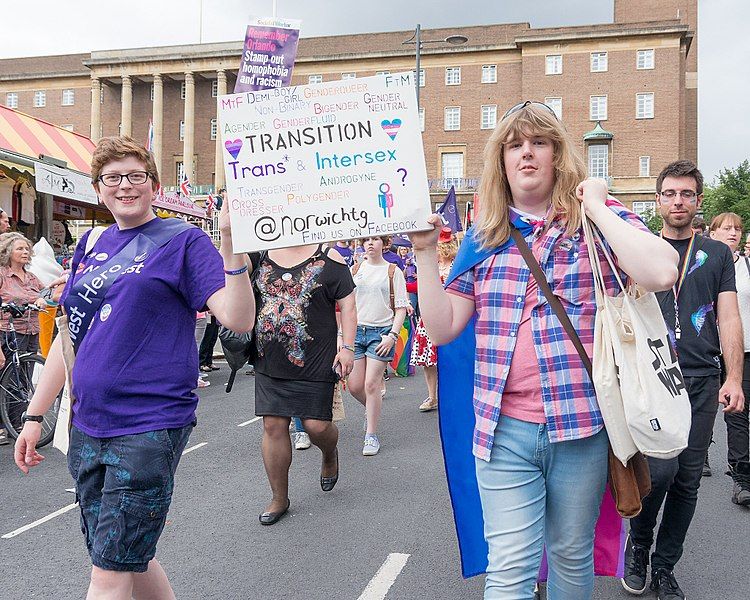Students have brought US-style social justice debates to the University of Copenhagen (KU).
Biology’s hot potato
When Dean Jacobsen, an associate professor of biology at KU, said he was compelled to change his usage of gender pronouns in his teaching, it signalled the arrival of PC culture on campus.
Students advocated for the inclusion of people who don’t fit into the male and female gender binary in teaching. In addition to the pronouns ‘him’ and ‘her’, manufactured pronouns like ‘zim’ are increasingly being used to indicate gender neutrality.
Following a discussion with students, Jacobsen said he would check his methods in order to accommodate students who felt he should not use examples of men and women in his teaching. But he feels this means a compromise of his own beliefs.
No intention to insult
“I don’t have any interest in insulting anyone, obviously. It encourages me to think more about the way I teach, but I also think it’s absurd,” Jacobsen told Jyllands-Posten newspaper.
“Am I now not permitted to refer to people as ‘he’ or ‘she’ then?”
Echoes in Lund
The complexity of this debate means official guidance is not definitive, as Germund Hesslow found out at Lund University in southern Sweden when he came under investigation for transphobia.
Hesslow lectures in neurophysiology and was asked to “distance” himself from the idea that there are biological differences between men and women.
Why ‘zim’?
Gender pronouns are the gateway to a larger gender binary debate with significant social and legal ramifications.
May Simón Lifschitz, a Danish transgender model, told Copenhagen Fashion Week that highlighting gender nonbinariness can promote social acceptance.
“Like any other revolutionary thought, I guess, gender fluidity needs to be overexposed before it can be integrated as something natural,” Lifschitz said.
The legal recognition of a third gender allows for greater self-determination in the trans community, explained Riley, a Swiss agender person speaking to Vox Media.
“For everything about you or your body, you have to wait for a doctor’s approval. Document changes, hormone replacement therapy etc takes a lot of time, energy and money for what is mostly just waiting where some stranger has more rights about your body than you do,” ze said.
Legal gender in Denmark
In Danish law, legal gender remains binary – male or female – and no other status is recognised. For non-binary people to gain recognition there may need to be a favourable answer to the question of whether gender identity is rooted in biological fact.
Because while conservatives often claim that gender is a purely psychological phenomenon, trans advocates argue that gender is a biologically constitutive part of sex.
Elsewhere in Europe
On January 1, Germany became the first European Union country to legally recognise a third gender.
Lynn D, a German intersex person, told CNN he hopes this will help society understand non-binary people better and to not fear them.
Student advocacy
Legal changes may be slow, but students are stepping up to the task of social change.
“I think there is generally greater awareness among the students in terms of looking out for one another. There has been a general shift in society in recent years regarding people becoming more aware of each other’s differences and making room for one another,” Amanda Büchert, a spokesperson for the student council at KU, told Jyllands-Posten.
Clear answers sought
The organisation that will be asking many of the important questions is Copenhagen’s student LGBT organisation, BLUS.
Perhaps soon there will be a clear answer to the question of whether a member of a faculty could be punished for failing to use other pronouns.
Trans rights in Denmark:
Pre-2017: All trans health matters were referred to the Sexology Clinic in the capital region. The trans community fiercely criticised this as an inappropriate system for processing trans people
Jan 2017: Trans people were removed from the list of psychiatric diagnoses, but their treatment remained at the Sexology Clinic
Feb 2019: Adult members of the trans community can seek treatment at the newly-created Center for Gender Identity (CKI) at Rigshospitalet
Milestone moments:
2014: Denmark passed a law allowing individuals the right to change their official gender. But legal gender remains binary and only transsexual people without a legal gender change can obtain an ‘X gender’ marker in their passport
January 1: Germany became the first country in the EU to offer a ‘third gender’ option on birth certificates
Last week: five major airlines in the US confirmed to USA Today that they plan to offer a non-binary option















